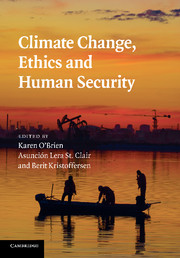5 - Fair decision making in a new climate of risk
Published online by Cambridge University Press: 01 June 2011
Summary
Introduction
Adaptation to the impacts of climate change is happening now. No-one asked for the opportunity to adapt – clearly it is a set of actions in a situation caused by past and present human-induced change and hence a manifestation of past inequitable use of the earth's resources (Adger et al., 2006). But adaptation is a central part of the changing landscape of human security and insecurity brought about by a changing climate.
Justice in the context of adapting to this new set of risks does not, therefore, simply involve a set of decisions on intertemporal and intergenerational equity involving trade-offs between unrepresented future agents and present actors and their interests. Rather, present day adaptation to climate change itself involves those justice dilemmas inherent in implementing sustainable and equitable development. The actions to maintain security are structured by present and historic inequalities in the distribution of access to resources and to power and decision making. There is now incontrovertible evidence of observed warming and trends in climate variability, and on the impacts of these trends on plants, animals, water, glaciers and ice is already apparent (Rosenzweig et al., 2007). These impacts are consistent with projected future climate change, though the possibility of significant and even catastrophic impacts outside the assessed range is also real (Schellnhuber et al., 2006). But the key point is that adaptation is already underway (Adger et al., 2007).
- Type
- Chapter
- Information
- Climate Change, Ethics and Human Security , pp. 83 - 94Publisher: Cambridge University PressPrint publication year: 2010
References
- 9
- Cited by

